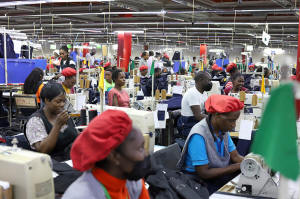Thousands of jobs at risk in Africa as US trade deal expires
[October 01, 2025] By
JACK DENTON and DESMOND TIRO
NAIROBI, Kenya (AP) — Workers and industry are bracing for the end of a
longstanding U.S. trade agreement that gave African exporters
preferential treatment and now leaves businesses vulnerable to new
competitive pressures and tariffs.
The African Growth and Opportunity Act will terminate as scheduled
Tuesday amid uncertainty over renegotiations and the looming impact of
new tariffs announced by the White House in April.
AGOA is a multilateral trade agreement that has given thousands of
products from qualifying African nations duty-free access to U.S.
markets since 2000.
A key example of the deal's impact can be found in Kenya, where it has
allowed the country’s textile and apparel sector — makers of jeans, for
instance — to effectively compete with Asian exporters such as in
Bangladesh and Vietnam.
“If AGOA goes away we have zero chance to compete with the Asian
countries,” said Pankaj Bedi, owner of United Aryan, an apparel
manufacturer in Nairobi that exports Levi's and Wrangler jeans to the
U.S.
Textile and apparel exports from Kenya to the U.S. have grown from
around $50 million when AGOA was first introduced to around $500 million
today.
“I will be asking (Trump) for the U.S. to consider seriously renewing
and extending AGOA for at least a minimum of five years,” Kenyan
President William Ruto said last week at the U.N. General Assembly. “It
is a platform that connects Africa and the U.S. in a very fundamental
way.”
AGOA had also given African countries hope that major elements of their
export economies would be exempt from blanket tariffs of 10% — and in
some cases much higher — announced by the U.S. earlier this year.

Kenya is already paying 10% on non-AGOA exports, which are not many.
Kenyan manufacturers will struggle to compete with rivals in Asia, even
though some Asian countries may face a higher U.S. tariff, because of
the limited domestic supply chain in Kenya where most of the raw
materials are imported, as well as higher energy costs, lending rates,
and operating expenses.
Ruto and other African leaders are pushing for a last-minute
renegotiation of AGOA while also scrambling to sign new bilateral
agreements with the U.S. They are doing so amid a period of seismic
change in global trade dynamics and with a White House that shows a
mixed commitment to Africa.
“African countries including Kenya must be alive to the possibility that
AGOA won’t be extended, AGOA won’t be remodified, and … America won’t be
interested in having a trade pact,” said Raphael Obonyo, a public policy
expert at UN Habitat.
[to top of second column] |

Factory workers operate machines to make garments at United Aryan
EPZ Limited in Ruaraka on the outskirts of Nairobi, Kenya, March 21,
2025. (AP Photo/Andrew Kasuku, File)
 Ruto said last week that Kenya and
the U.S had made “good progress” toward a bilateral agreement that
could be signed by the end of this year.
AGOA has mostly benefitted African economies in both big and small
industries. The agreement has helped both the continent’s largest
exporters — Nigerian and Angolan oil, South African autos, and
Kenyan clothing—as well as some of its smallest economies where
exports are highly concentrated, such as Lesotho and Eswatini.
Some African economies, like Nigeria and Lesotho, are likely to face
“notable adverse effects” from the end of AGOA and new U.S. tariffs,
researchers at the German Institute of Development and
Sustainability wrote in a brief.
While there may be limited macroeconomic effects across Africa as a
whole from changes to U.S. trade, these assumptions “likely
understate the full impact of new Trump-era tariffs and do not
capture the indirect effects like reduced foreign investment,
weakened supply chains, rising poverty, or the loss of
capacity-building,” the researchers added.
AGOA-dependent industries likely employ some 1.3 million people
whose jobs are now at risk — in countries where many people have few
if any other options in the case of sudden unemployment.
In Kenya, more than 66,000 people, many of them women, were employed
through now-vulnerable textile and apparel exporters to the U.S. In
the garment districts of Kenya’s bustling capital, job cuts and
fears over livelihoods have already begun.
United Aryan said this week that it will shed some 1,000 jobs or 10%
of its workforce amid trade uncertainty.
“There is no way we can survive,” added Bedi, who is also the
apparel export sub-chair at the Kenya Association of Manufacturers.
For Julia Shigadi, a machinist at United Aryan, the end of AGOA is
an existential threat.
“This has been my bread and butter,” said Shigadi. “I only depend on
this job—so if it is gone, it means my life is gone too.”
All contents © copyright 2025 Associated Press. All rights reserved |